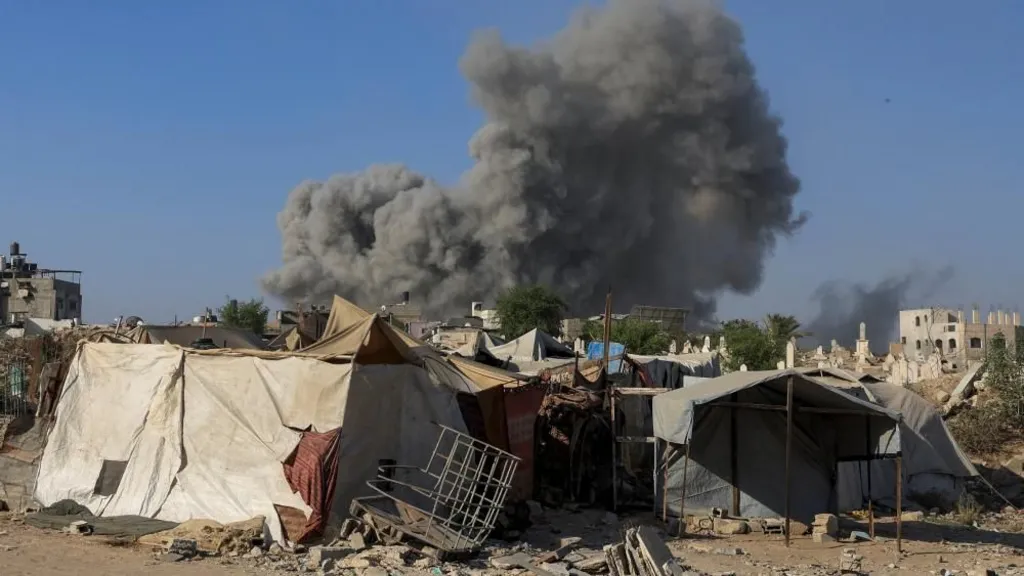Israel Intensifies Strikes on Gaza City as UN-Backed Experts Declare Famine
Heavy bombardment around Gaza City coincides with an official famine declaration by the world’s food-crisis authority, spurring urgent calls for a ceasefire and unhindered aid access.
- Israeli strikes hit eastern and northern approaches to Gaza City amid preparations for a larger offensive.
- UN-backed analysts say famine is occurring in Gaza City, with risks of spread without immediate intervention.
- Aid-seeking civilians have been killed near key corridors, underscoring the perilous access to food and medicine.
- Global pressure mounts for a ceasefire and unimpeded humanitarian corridors; Israel disputes the famine designation.
What Happened and Why It Matters
<p>In the early hours of Sunday, residents in and around Gaza City reported sustained bombardment from air and artillery strikes targeting neighborhoods to the east and north. Local accounts described homes and buildings destroyed as Israel signaled a new phase aimed at dismantling remaining Hamas positions in the urban core. The escalation is part of a broader push to secure tactical control of approach routes before any deeper ground operation.
Famine Officially Declared in Gaza City
<p>The Integrated Food Security Phase Classification (IPC)—the globally recognized authority on food crises—has determined that famine is occurring in Gaza City. The IPC’s analysis indicates widespread starvation, acute malnutrition, and hunger-related deaths affecting hundreds of thousands, with the situation projected to worsen without urgent action. While Israeli officials dispute the designation, UN agencies have called the crisis a man made disaster and urged immediate. large-scale humanitarian access.
Humanitarian Picture on the Ground
Across the Strip—and especially in the north—families queue for hours near distribution points for small rations of staples. Witnesses and health workers report dangerous conditions along aid corridors, with incidents of live fire and stampedes as desperate crowds surge toward trucks. Hospitals, already strained by mass-casualty events, describe rising cases of wasting in children, dehydration, and preventable deaths linked to hunger and disease.
- Aid Access: Relief groups say access remains inconsistent and unsafe, with logistical bottlenecks at crossings and within internal corridors.
- Medical Capacity: Shortages of fuel, medicines, and surgical supplies limit trauma care and treatment for malnutrition.
- Displacement: Repeated displacement disrupts aid delivery and undermines coping strategies for already vulnerable households.
Military Context and Strategic Calculus
Israeli leaders frame the current operations as necessary to neutralize remaining Hamas capabilities embedded in dense urban terrain. Urban warfare dynamics—tunnels, booby traps, and close-quarters combat—raise the risks of civilian harm. Strategically, controlling approach routes and severing supply lines are prerequisites for any larger ground maneuver. But the human toll and infrastructure damage deepen the long-term governance and stabilization challenges that would follow.
International Reactions
The latest strikes and the famine declaration have intensified diplomatic pressure. UN agencies and major humanitarian organizations are urging an immediate ceasefire, the removal of bureaucratic and physical impediments to aid delivery, and accountability where violations are found. In parallel, domestic debates in several countries have sharpened over military aid and arms sales linked to the conflict.
What the Data Signals Next
If current access constraints persist, modeling by food-security experts suggests mortality could accelerate, particularly among children and the elderly. A rapid scale-up in food, water, sanitation, and health services—coupled with durable ceasefire arrangements and assured deconfliction for aid movements—would be required to arrest the trend. Without these steps, famine conditions are likely to spread beyond Gaza City into other governorates.
Key Numbers at a Glance
- Classification: IPC Phase 5 (Famine) reported in Gaza City.
- Human Impact: Hundreds of thousands facing acute food shortages, with hunger-related deaths already recorded.
- Operational Picture: Intensified strikes around eastern and northern approaches to Gaza City; fears of broader ground operations.
Tags: Gaza City, Famine, IPC, Humanitarian Aid, Middle East, Israel, Hamas






Embark into the vast universe of EVE Online. Become a legend today. Explore alongside hundreds of thousands of explorers worldwide. Download free